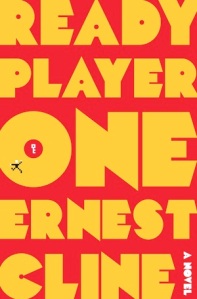Ready Player One by Ernest Cline
 To be honest, I was apprehensive about this book. Every glowing recommendation that I received came with the rave-cum-caveat that it was basically the geekiest thing ever written and therefore I would love it. Unfortunately, geek though I am, I have lately found myself tiring of the metageek geek-for-geek’s-sake self-referential geekery that seems to have crept into geek culture. You know what I’m talking about, the land of the intentionally-pixelated Christmas wreath and the borderline-ironic love for shitty 80s cartoons.
To be honest, I was apprehensive about this book. Every glowing recommendation that I received came with the rave-cum-caveat that it was basically the geekiest thing ever written and therefore I would love it. Unfortunately, geek though I am, I have lately found myself tiring of the metageek geek-for-geek’s-sake self-referential geekery that seems to have crept into geek culture. You know what I’m talking about, the land of the intentionally-pixelated Christmas wreath and the borderline-ironic love for shitty 80s cartoons.
For this reason I found myself occasionally walking over to my borrowed copy, picking it up, and then setting it back down because I simply didn’t want to deal with it. And, for the first few chapters, my fears were realized, as our painfully geeky protagonist Wade told us about the übergeek and his contest to find the ultimate Easter Egg hidden within a virtual pop-cultural labyrinth of absolutely monumental proportions. It took me, oh, 4-5 sittings to get through the first five chapters, rolling my eyes the whole time.
Then a funny thing happened: the story finally kicked in and all the Matthew Broderick/Atari/Monty Python window dressing folded itself neatly around this guided missile of a plot, and the next time I came up for breath I was halfway through the book. Finished the whole thing in less than an afternoon. Turns out, in the future post-energy-crash world, everybody lives most of their lives plugged into the ultimate virtual-reality MMO game, the OASIS. The creater of said game announced a contest upon his death, wherein the first person to solve a series of puzzles related to his obsessive love of 80s pop culture and find the hidden Easter egg would inherit the company that controls the game and instantly become a kajillionaire. So the world is now populated with the futuristic equivalent of billions of World-of-Warcraft addicts, all competing with each other for the most encyclopedic knowledge of 80s films, music, and especially video games. Individual egg-hunters compete with each other but also with an evil corporation bent on solving the puzzle first, by any means necessary, and gaining control over the world’s largest and most profitable business. The story evolves into an extended chase sequence interwoven with some elaborate and (often literally) cinematic set pieces, marred only by a bit of (again, literal) deux ex machina near the denouement. But the most compelling aspect of the book is the interaction between the five hunters that eventually begin solving the puzzle and building relationships despite never having met in “real life”. Characters squabble, commiserate, and fall in love virtually, to the point where it doesn’t matter anymore who they really are, because their online personas are just as real as their flesh-and-blood bodies.
Prior to reading this book, I would have sworn that Neal Stephenson was the only author who could have turned this nerd stew into something actually exciting, and I would have been wrong. In fact, heresy though it may be to say it, Stephenson could learn a thing or two from Cline about focus, and about how to end a story. Reading Ready Player One is like watching Babylon 5; if you can make it through the tedious first bit where pieces are (by all appearances) clumsily being put into place, you’ll be sucked along for the ride when everything gets turned up to 11. And if that isn’t a geeky enough simile, I don’t know what is.
